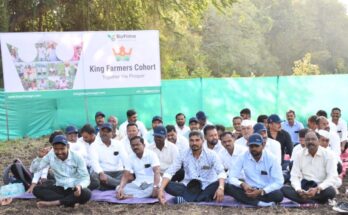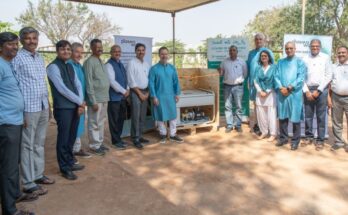Tallinn, Estonia – eAgronom, the agriculture-focused climate tech company helping farmers adopt sustainable practices for the health of their farms and the planet, has achieved a major milestone in its outreach focused on the African continent. By the end of 2023, eAgronom will have onboarded 200,000 hectares of agricultural land on the continent into its carbon credit programme. Using sophisticated soil health tracking technology and hands-on education in sustainable farming practices, eAgronom is making farms across Africa into carbon sinks that fight global emissions. These farms are spread across Rwanda, Kenya, South Africa, and Tanzania.
East and southern Africa are regions of enormous potential and importance to the global agricultural community and economy. Increasing sustainability efforts related to local food production in these regions could have an enormous impact equivalent to offsetting the carbon emissions of the entire global aviation industry. Soil restoration efforts could also double food production on the continent, which is essential in drought-prone climates.
You may also like to read: Steps India is taking towards the modification of agricultural practices to combat climate change; read here…
Active in these regions since Q4 2022, eAgronom works with farmers to implement regenerative agricultural practices that enrich soil quality to increase annual yield over time. Prioritising long-term soil health ensures the future generations will inherit workable land and actively benefits the development of agriculture-centric communities and cooperatives.
Food and economic security are especially crucial on the African continent, where average land ownership is considerably smaller than in other parts of the world. Average farmland ownership in Kenya is three hectares; in Rwanda, it is just one. With 30-plus on-the-ground employees and partners, eAgronom can work directly with cooperatives and unions on the continent and engage as many small farmers as possible. eAgronom also collaborates with resellers to make sure projects are individually suited to the specific needs of communities and microclimates. These resellers have their teams working in the fields to monitor and adjust farm management software and track essential data for sustainability-related measures.
You may also like to read: Zydex Industries, Parul University ink MoU to introduce Bachelor’s and Master’s programs in Bio Farming
Robin Saluoks, co-founder and CEO of eAgronom, said, “The initiatives we are leading in eastern and southern Africa are incredibly multi-faceted, touching on food security, climate change, economic growth, and community resilience. Reaching the 200,000 hectares milestone is significant because most of those hectares are cultivated by small, independent farmers who are pillars of their communities. This is work we’re immensely proud of, and we’re only getting started.”
eAgronom has already mobilised over 50,000 farmers in Rwanda alone in a group initiative to increase organic matter in the soil. This, in turn, improves soil quality and its carbon sink capabilities. The company is currently spearheading a soil test project in Tanzania, financed by the Republic of Estonia through the Environmental Investment Centre. Further expansion into Uganda, Zambia is already in the works.





